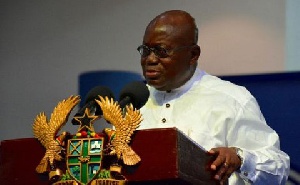 President Nana Addo Dankwa Akufo-Addo
President Nana Addo Dankwa Akufo-Addo
There is something to be said about the standard of responsibility that the government holds everyone to.
Take the case of uncovering of corruption allegations against some members of the executive committee of the Ghana Football Association.
The swiftness of the government was unprecedented. The government clearly had a road map on how to “clear up” things at the country’s football association.
The government has not been deterred by the fact that the association is a private association.
All the government needed was one documentary to get into action.
That was it. Just one documentary. As we speak, the government’s lawyers have successfully obtained an injunction from a high court and are expected to go ahead with the liquidation of an association formed by other people.
Take the case of the Electoral Commission. Also the government acted with dispatch in the impeachment and dismissal of the electoral commissioners.
Government will by all means be in a haste to use these examples as signs that it is committed to fighting corruption. And of course, its communicators will be happy.
But the truth is that government’s stance is nothing but double standards.
It is easy to play tough against outsiders and those distant from the corridors of power.
But will the President be man enough to deal with corruption when the question is brought closer home to him? That is the fundamental question. And my response is no.
If the government were serious about fighting corruption, then a good starting point will be to investigate into the circumstances that the New Patriotic Party, which when in opposition were struggling financially, now had what it takes to acquire 275 buses for each of the party’s constituency.
Basic economic principles teach us that people are willing to make rational economic choices.
There has to be an incentive for the party chairman to take steps to acquire these buses for the party.
No. This government is not extra-ordinary. It is made up of good men and women. But it is also made up of corrupt men and women as well.
In fact, there is no such thing as good men and women in politics.
Everyone is susceptible to influence in one way or the other. The key difference is the accountability systems that are put in place.
In a country with systems which do not bite, it is going to be business as usual.
People are going to device ways and means of robbing the state.
They are going to sell these devises to political operatives who have used all their monies to sponsor delegates.
They will buy into those schemes.
They then enter into strange deals and unholy alliances.
This, in a major way, explains why we struggle to achieve the things that other nations have achieved easily for themselves.
It is fair to say that we have had enough of the tokenism in the fight against corruption.
Charity must begin at home. Under the Kufuor regime, we saw the incarceration of Mallam Issah and other opposition elements.
That was all.
There was never a real fight against government appointees.
And there was no concrete effort to ensure that corruption was prevented in the first place.
The same window dressing approach was seen under the Mills-Mahama era.
The same is being seen under this administration. Same old window dressing.
There is a lot of pretence when it comes to dealing with corruption.
And while at it, we forget the monies that are diverted and lost to corruption cost the country more than we can ever imagine.
Blame corruption for the bad roads.
Blame corruption for the poor health services.
Blame corruption for all the things that drag us down.
Blame corruption for the poor public service delivery.
Blame corruption for the inability of revenue agencies to meet their targets.
It is a good thing for the government to hold others to account. There is nothing wrong with it.
But can the government hold itself to this same standard? That is the question.